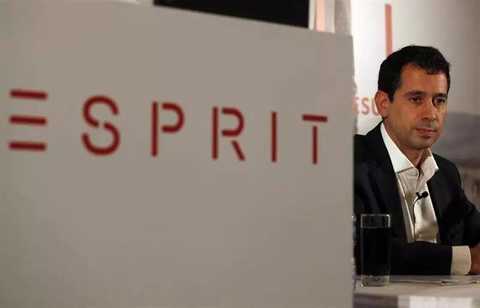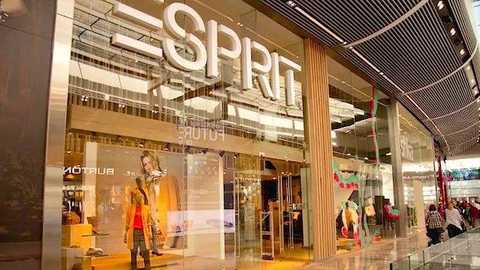Esprit, a fashion brand that has fallen into a downturn, is also facing a new round of reshuffle. According to the fashion business news, Esprit parent company Esprit (00330.HK) announced today that Rafael Pastor Espuch will step down as president of the group's products, effective May 17, 2018. Since November 2013, Pastor has been the Chief Product Officer of Esprit, where he previously served as a women's executive in the fast fashion Zara. According to the group, the head of the women's department, the head of the men's department and the head of the management authority will report directly to the group CEO during the transition period. The picture shows Jose Manuel MartÃnez Gutiérrez, the CEO who had been highly anticipated. It is noteworthy that Esprit announced last month that Jose Manuel MartÃnez Gutiérrez will leave the company's executive director and group CEO, and will be replaced by Anders Kristiansen, effective June 1, 2018. In August 2012, Esprit International hired Zara's coach Ma Haosi to join the rival Zara's coach Ma Haosi with a "paying emperor"-level salary of 40.35 million Hong Kong dollars. It once stimulated the group's share price to soar 38.4%. In just over a month, this is already the second Esprit executive to leave Zara's executives. Esprit, which is no longer in sight, seems to have finally accepted the fact that Zara failed to imitate fast fashion. According to the fashion headline data, during the first half of the fiscal year ended December 31, the Group's performance continued to be sluggish, with sales falling 3.4% year-on-year to HK$8.039 billion and net loss of HK$954 million. In the face of the rapid fashion wave, Esprit decided to learn from Zara, the fastest growing fast fashion, when sales fell below 30 billion Hong Kong dollars. At the same time, the Brazilian female model Gisele Bundchen was invited to speak for the brand. After joining Esprit, Ma Haosi introduced three other executives, Juan Chaparro, Elena Laz canotegui and José Antonio Rioos, from Inditex Group. The long four-year “Zara†transformation plan of Esprit has officially opened. As the most successful textbook case of fast fashion, Zara has won more and more consumers by imitating luxury brand product design, fast updating products and low-cost market strategy. From design to ready-to-wear sale, Zara is only 7 days in minimum. Usually 12 days. According to the data, Zara has launched about 12,000 models a year, each of which is limited in quantity, and is not replenished after it is sold out. The team of nearly 400 designers will quickly launch fashions that are similar to the latest designs of popular brands after the major fashion shows. This brand business model is known in the industry as the "Zara" model. For FY 2018, Esprit will continue to reduce its retail sales and accelerate the closure of underperforming stores. In contrast, Esprit relies on the traditional business model of retail and wholesale to become a major drag. After each season of new product design, Esprit often needs to go through two or three months of fabric procurement period, and then handed over to each factory for production. During the order meeting, the production will be adjusted according to the order of each branch and agent, and finally to the distribution and replenishment stage. Esprit's products, from the beginning of the design to the sale, often take more than 9 months. After the team of Ma Haosi entered the company, Esprit began to carry out vertical reforms. The specific measures include reducing one-third of suppliers, reducing styles, and passing the past. The 12-month product line has become a four-season product, with some products shrinking from design to shelf time to two to three months, optimizing inventory, etc., but Zara is still not comparable. For Esprit's "Zara" transformation strategy, some analysts believe that although Zara and Esprit are both clothing brands, there are essential differences. Zara relies on a heavy asset company, with 50% of its products originating from its own factories and having an absolute initiative in the supply of products. Esprit, on the other hand, is a standard light asset company whose long supply chain and huge inventory have become a major obstacle to brand change. “Those executives commanded the Chinese market in distant Germany, and the designers sat in the office building in Hong Kong lazily drinking coffee and were unaware of the rapid changes in the outside world,†said an executive responsible for Esprit’s business in China. Said. In order to make vertical mode more efficient, Ma Haosi also adopted an omni-channel retail model to improve sales channel efficiency. In 2014, Ma Haosi's first transcript was announced. During the period, Esprit's revenue in the most important Chinese market in Asia fell by 28.3%. In the first half of FY2015, the brand's quarterly sales fell to the lowest level since 2001. To make matters worse, in order to clean up the slow-moving inventory as soon as possible, the frequent promotion activities of Esprit dealers have caused serious damage to the brand image. Esprit is farther and farther away from the fashion king in the eyes of consumers. With the sharp decline in performance, in recent years Esprit has a total of more than 12 executives to run away. At the end of May 2015, Esprit closed its entire retail outlets under the Unisex and Promod brands to save Esprit. In October 2015, Ma Haosi moved from LVMH to rescue the army and invited Guillaume Thery, a 16-year veteran of LVMH, to serve as the general manager of the Group's Asia Pacific region, responsible for the overall business development of Esprit in the Asia Pacific region including China. With the fast-fashioned fall out of favor, the original "Zara" model is also facing challenges. Esprit's shifting the sales channel from offline to online does not save its fate. If it can't completely complete the supply chain shortcomings, let the product become Fashionable, Esprit, which has been suppressed for more than 10 years, is harder to turn over. Earlier this month, Esprit was withdrawing from the Australian and New Zealand markets, closing 67 stores in both locations, with an estimated closing cost of HK$200 million (US$25.6 million). The move will allow the apparel company to focus on key Asian markets such as China, Hong Kong, Taiwan and Singapore. The company abandoned its flagship store in Causeway Bay, Hong Kong's business district, two weeks ago. Before the announcement of the departure of the product's president, Esprit (00330.HK) shares closed up 1.15% to HK$2.63 per share today, but since this year, its market value has evaporated by 45%, currently at HK$4.96 billion. Editor in charge: Gao Wei Rayon Woven Fabric,100% Viscose Fabric,Woven 188Gsm Plain Fabric,Plain Purple Fabric Shaoxing Weihui International Trade Co.,Ltd. , https://www.weihui-fabric.com
